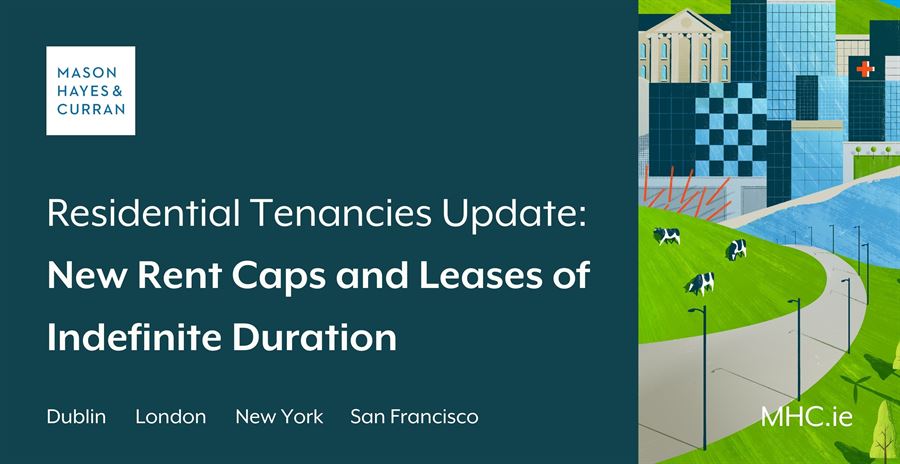
The Government has published the latest in its raft of residential tenancies related measures in the form of the new Residential Tenancies (Amendment) (No.2) Bill 2021 (the Bill). The Bill, which was published on 15 November, proposes to introduce significant changes to the regulation of residential tenancies in Ireland. Key changes include capping rent increases at 2% in Rent Pressure Zones (RPZs) and providing for tenancies of unlimited duration.
The Residential Tenancies (No.2) Act 2021 (the 2021 Act), which was enacted in July, replaced the previous 4% per annum cap on rent increases in RPZs. The 2021 Act capped rent reviews at general inflation levels by reference to HICP values (All-Items Harmonised Index of Consumer Prices). However, due to concern over rising inflation levels, the Government has introduced this new Bill. The new Bill will effectively cap rent increases in RPZs at the lower of 2% per annum or HICP. This is subject to the overriding restriction on rent not exceeding market rent.
The new rent cap rules will apply to rent reviews carried out during a tenancy and to the setting of rents upon the commencement of new tenancies. The new rules will apply from the date of commencement of the relevant section of the new Bill (section 3).
Enhanced security of tenure protections for tenants are also proposed in the Bill, which will legislate for tenancies of unlimited duration. A ‘Part 4 tenancy’ comes into existence after a residential tenancy has run for a period of 6 months. The tenant then becomes entitled to stay in the property for a further 5 and a half years subject to limited exceptions for termination by the landlord. At the end of the 6 year period, a landlord is currently entitled to terminate the tenancy without having to rely on a specific ground for termination. The Bill proposes to bring an end to that entitlement. This would ensure that these tenancies could only be terminated by the landlord if one or more permitted grounds for termination exist.
These new security of tenure provisions will come into operation six months after the Bill is enacted and will only apply to tenancies created, including tenancies renewed after Part 4 tenancies expire, after the commencement of the measures. This will mean that it will be six years and six months from the commencement of the Act before all residential tenancies in the State will be of unlimited duration.
Housing Minister Darragh O’Brien stated that this Bill “respects the constitutionally protected property rights of landlords and aims to safeguard continued investment in the sector by existing and new landlords to deliver the requisite supply of high-quality rental accommodation”. The Department of Housing, Local Government and Heritage has stated that this Bill will be progressed to enactment as a matter of priority so we can expect to see these changes enacted imminently.
Conclusion
Once enacted, the Bill will bring about further restrictions on rent increases and provide enhanced protections for tenants. It is the latest in a series of measures introduced by the Government in recent months. With a continued focus by Government on housing and residential tenancies, it remains to be seen what further measures we may see in the coming months.
For more information on the residential tenancies, contact a member of our Real Estate Team.
The content of this article is provided for information purposes only and does not constitute legal or other advice.





